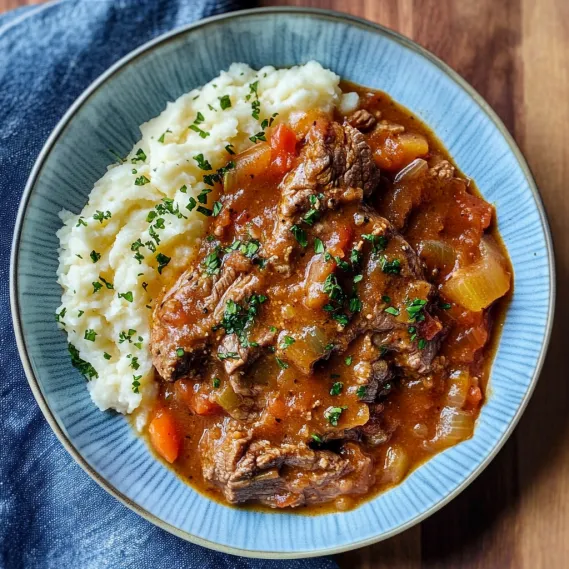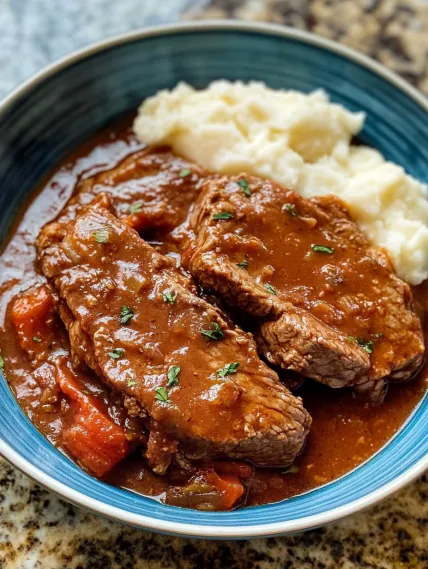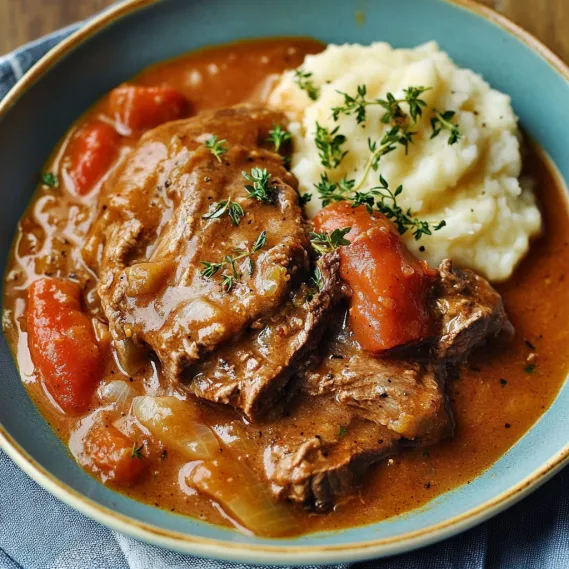 Pin
Pin
This classic Swiss Steak transforms tough cuts of beef into melt-in-your-mouth tender meat surrounded by a rich tomato gravy. My grandmother taught me this recipe when I was just learning to cook and its comforting aroma still takes me back to Sunday dinners at her farmhouse table.
I first made this recipe as a newlywed trying to impress my husband with something special yet budget friendly. Twenty years later it remains his most requested birthday dinner and has become our family tradition for celebrating special occasions.
- Bottom Round or Top Round Steak: Choose cuts with minimal fat and visible marbling for the best texture transformation during cooking
- All purpose flour: Creates the perfect crust when browning and naturally thickens the sauce
- Kosher salt: Essential for bringing out the beefs natural flavor use more than you think you need
- Fire roasted diced tomatoes: The slight char adds remarkable depth compared to regular diced tomatoes
- Worcestershire sauce: This umami powerhouse is the secret ingredient that makes people ask for your recipe
- Dried marjoram: Often overlooked this herb provides the distinctive flavor that makes Swiss steak authentic
- Low sodium beef broth: Using low sodium allows you to control the saltiness of the final dish
- Fresh parsley: Optional but adds bright color and freshness to an otherwise rich dish
Step by Step Instructions
- Tenderize the Meat:
- Cover your steak with plastic wrap and pound it thoroughly with a meat mallet until it reaches about half inch thickness. This mechanical tenderizing is crucial as it breaks down tough muscle fibers before cooking even begins. Take your time with this step working from the center outward with firm even strokes. Cut into serving sized pieces afterward.
- Season and Flour:
- Combine your flour salt and pepper in a shallow dish. Season both sides of your steak pieces generously with additional salt and pepper then dredge in the flour mixture ensuring complete coverage but shaking off excess. This coating is doing double duty creating a crust and thickening your eventual gravy.
- Brown the Meat:
- Heat your oil in a Dutch oven until shimmering then carefully add your floured steak pieces leaving space between them. Allow them to develop a deep golden crust about 4 minutes per side before flipping. Work in batches if needed as overcrowding will steam rather than sear the meat. Transfer to a plate when done.
- Create the Flavor Base:
- Reduce heat to medium and add your onions and carrots to the pot scraping up all those wonderful browned bits from the bottom. Cook until vegetables soften about 6 minutes then add garlic for just 30 seconds until fragrant. Stir in tomato paste and cook for 2 minutes until it darkens slightly in color developing its natural sweetness.
- Build the Sauce:
- Pour in beef broth while stirring vigorously to release any remaining fond from the pot bottom. Add your diced tomatoes Worcestershire sauce and herbs stirring to combine. Return the browned steak to the pot nestling pieces into the liquid so theyre mostly submerged but not completely covered.
- Slow Cook to Perfection:
- Bring everything to a gentle simmer then cover with a tight fitting lid and transfer to your preheated oven. Allow it to bake undisturbed for about 1 hour and 45 minutes. The slow even heat of the oven transforms the tough meat into fork tender perfection while the sauce reduces and intensifies in flavor.
- Final Touches:
- Remove from oven carefully lift the lid away from you to avoid steam burns and check the meat for tenderness. It should yield easily when pierced with a fork. Taste the sauce and adjust seasonings adding more salt pepper or Worcestershire sauce if needed. Allow it to rest for 10 minutes before serving over your chosen starch.

My grandmother always insisted on using her cast iron Dutch oven claiming it added iron to the dish. While the science on that might be debatable the emotional warmth of using her heirloom cookware definitely adds something special to the experience. Sometimes I find myself talking to her while stirring the pot continuing our kitchen conversations even years after shes gone.
Storage and Reheating
Swiss steak actually improves with time making it perfect for meal prep. Store leftovers in an airtight container in the refrigerator for up to 4 days. The sauce will thicken considerably when chilled which is completely normal. When reheating add a splash of beef broth to loosen the sauce and warm gently on the stovetop over medium low heat until the meat is heated through. Avoid microwave reheating which can make the meat tough.
Perfect Pairing Suggestions
While traditionally served over mashed potatoes Swiss steak pairs beautifully with other starches as well. Creamy polenta soaks up the rich gravy perfectly while maintaining its own texture. Buttered egg noodles offer a lighter alternative that still captures all the sauce. For a complete meal consider serving with a simple green salad dressed with vinaigrette the acidity provides perfect balance to the rich main dish.

Make Ahead Magic
This Swiss steak recipe shines as a make ahead meal option. You can prepare it up to two days before serving simply cool completely after cooking then refrigerate in the Dutch oven. When ready to serve remove from refrigerator about 30 minutes before reheating then warm in a 325°F oven until heated through about 25 minutes. The flavors will have married even more beautifully and youll have minimal preparation stress for dinner parties or family gatherings.
Troubleshooting Tough Meat
If your Swiss steak isnt fork tender after the recommended cooking time dont panic. Every cut of meat is slightly different. Simply continue cooking checking every 20 minutes until the meat reaches your desired tenderness. The key indicator is whether you can easily cut it with the side of a fork. If using an especially tough cut consider adding 1/4 cup more liquid and extending cooking time up to an additional hour.
Recipe FAQs
- → Why is it called Swiss steak when it's not from Switzerland?
- Despite its name, Swiss steak has nothing to do with Switzerland. The term 'Swiss' refers to the process of tenderizing the meat by pounding or rolling it, a technique known as 'swissing' in the textile industry.
- → What's the best cut of beef for Swiss steak?
- Bottom round or top round steak works best as specified in the recipe. Chuck steak or shoulder steak are good alternatives. These tougher cuts become tender through the pounding and slow cooking process.
- → Can I make Swiss steak in a slow cooker?
- Yes! After browning the meat and sautéing the vegetables, transfer everything to a slow cooker with the remaining ingredients. Cook on low for 7-8 hours or high for 4-5 hours until the meat is tender.
- → How do I know when the Swiss steak is done?
- The steak is done when it's fork-tender, meaning you can easily pull it apart with a fork. This usually takes about 2 hours of simmering, though tougher cuts might need additional time.
- → Can I freeze leftover Swiss steak?
- Absolutely! Swiss steak freezes very well. Store in airtight containers for up to 3 months. Thaw overnight in the refrigerator and reheat slowly on the stovetop or in the microwave.
